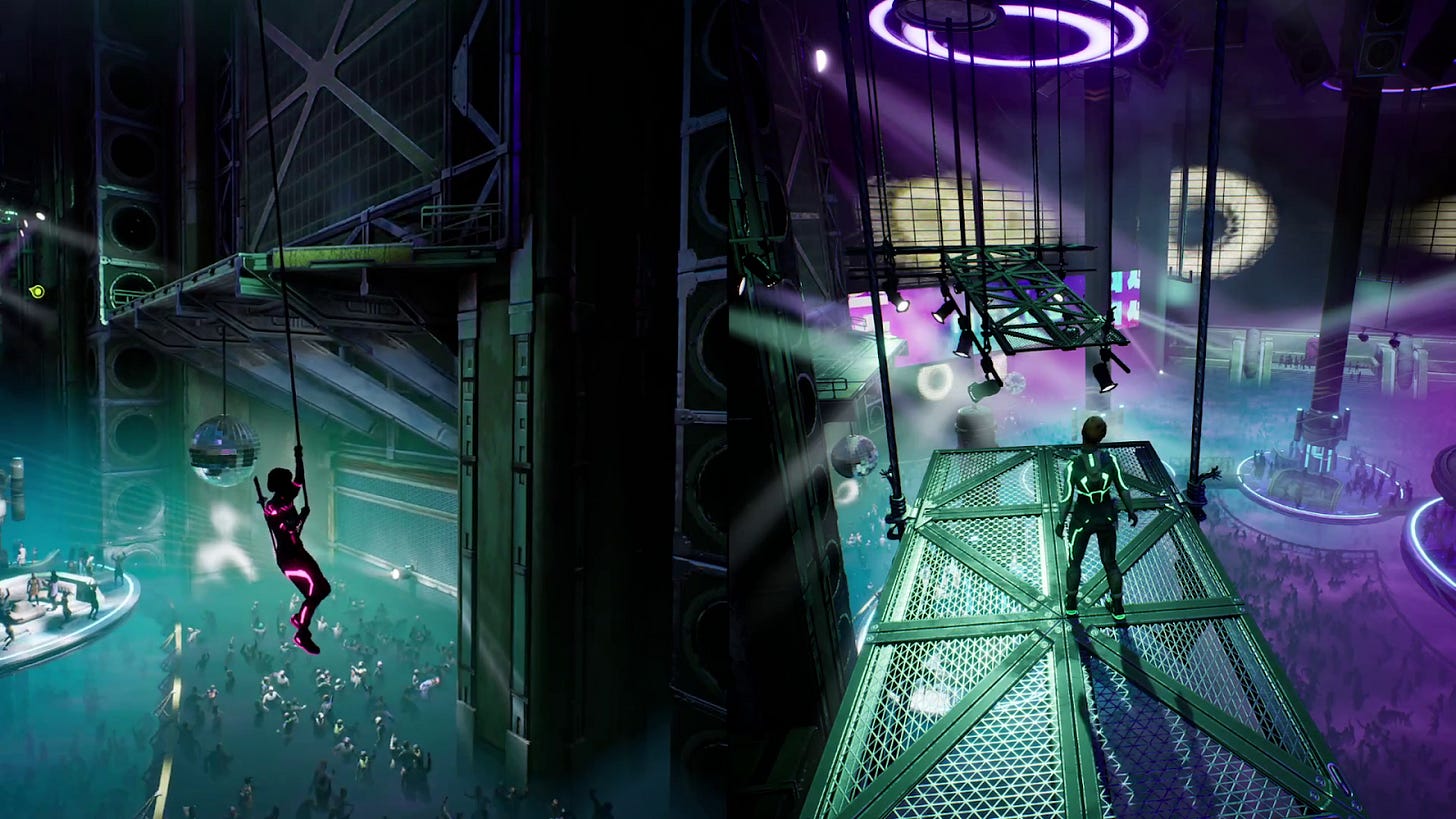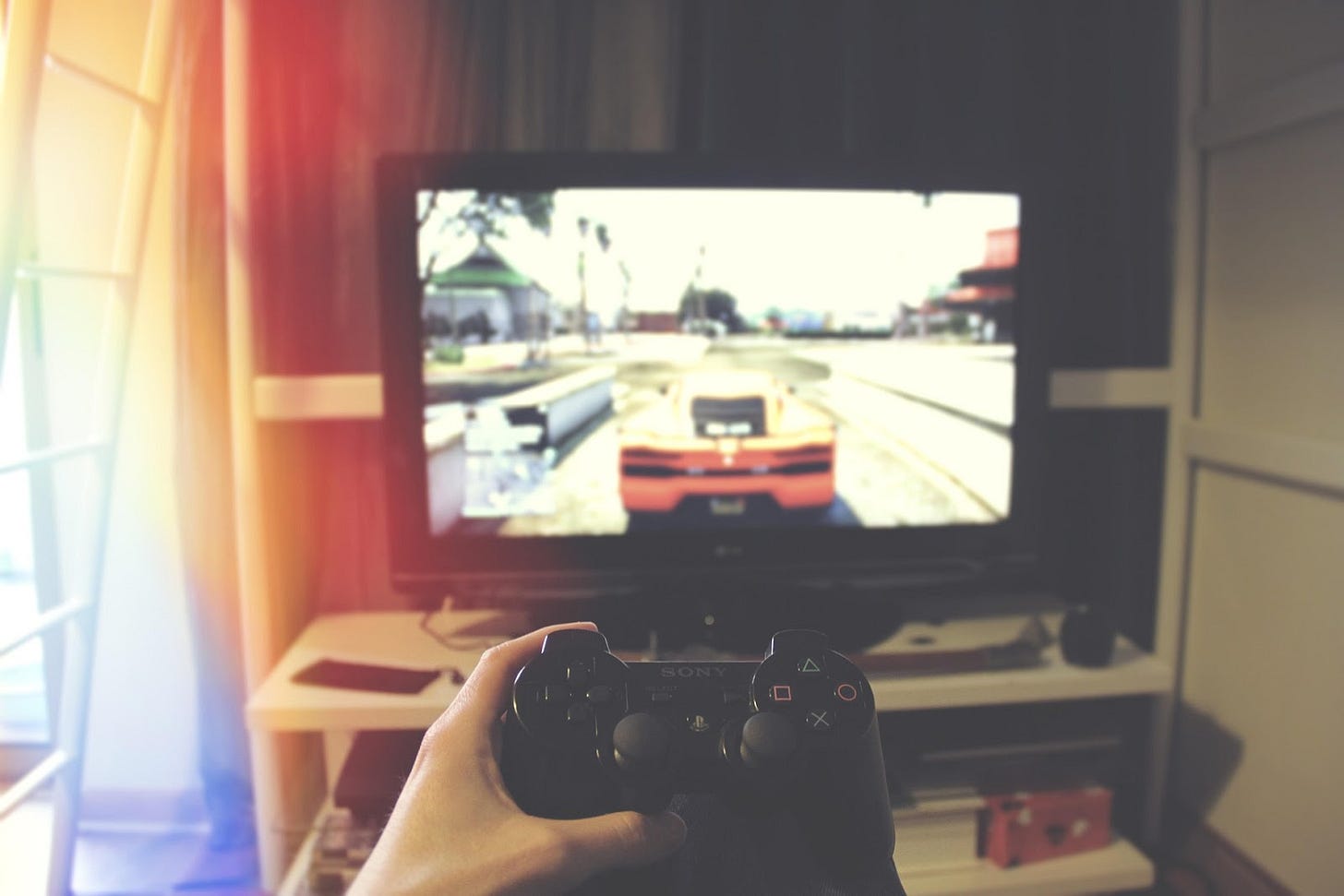The Load Screen Between Worlds
By Emanuel Echoga | A reflection on the joy, stillness, and sacred chaos of gaming; where drifting and domination both find their place.
Written by Emmanuel Ehi Echoga | Seeking Veritas Columnist | | Sankarsingh-Gonsalves Productions
“Start Game” as Escape
I never really picked up a controller to win. I picked it up to drift.
To roam in a world that wasn’t asking too much of me. To explore, to press buttons, to interact with whatever weird NPC (Non-playable Character) crossed my path. Sometimes I’d sit in a game menu longer than I’d actually play. Because gaming, for me, was never about being locked in. It was about letting go.
I think that’s why the older I get, the more I miss couch co-op. The lobbies that felt like safe zones. Not just from the world, but from the pressure of performance. It wasn’t about “popping off” or getting clips for highlight reels. It was about being together. About chaos, laughter, button-mashing, and one person yelling before they died, but still diving back in
Those early gaming moments weren’t built around streaks or speedruns, they were built around immersion and interaction. They taught me how to be present in a world I didn’t have to control, but could participate in. Freely. Playfully.
These days, it feels like so much of gaming culture is about optimizing, being cracked, top fragging, making sure the algorithm sees you as “worth watching.” And while I get the appeal (sometimes you do have to whip it out and show, as Kendrick once said), it makes me wonder: are we even having fun anymore?
Why should I have to lock in on life and then bring that same hyper-focus into every game I play?
Nah. Sometimes I just want to exist in a game. Not compete. Not prove. Just play.
And that’s where the real magic of gaming lives, at least for me, where exploration is the point. Where interaction builds meaning. Where immersion gives you breath, not burnout.
When the Real World Shifted, So Did the Game
There was a time when gaming was just something I did after life. After school. After assignments. After whatever emotional mess I didn’t feel like confronting yet.
But then life got heavier, and gaming didn’t stay the same.
There was a shift I can’t quite timestamp, but I remember the feeling. It was after a rough season, one of those quiet breaking points. You come back from something painful, and even the simple things feel different. You don’t laugh the same. You don’t sleep the same. You don't play the same.
That’s when I realized I wasn’t gaming just for fun anymore. I was gaming to feel less alone.
Games started meeting me in places people couldn’t. I’d boot up certain games, either alone or with familiar friends, and suddenly, silence had meaning. Suddenly, failure didn’t feel final, it felt like design. The music, the stillness, easter eggs that reminded you of the depths of life, and simpler things like the way light broke through darkness. These weren’t just game mechanics. They were emotional instructions. Breathing guides.
Gaming became my place to process without pressure. A place where I could fall apart, die a few times, try again, and still keep moving. No judgment. Just rhythm.
It stopped being about escaping life, and started being about living through it. Quietly. Safely. Fully immersed.
The Load Screen | Between Worlds
I’ve spent most of my life in-between things.
In between cultures. In between expectations. In between who I was raised to be and who I’m still discovering myself to be. That’s not always a bad thing, but it’s rarely simple. The space in-between is quiet, uncomfortable, often misunderstood. But it’s also where growth happens.
And maybe that’s why I’ve always found a strange comfort in video games. Because they, too, are built on thresholds.
The load screen. The respawn point. The moment right before the next level starts. You’re not where you were, but you’re not quite where you’re going. You’re loading, which, in many ways, is what growing up feels like.
In games, that space isn’t failure, it’s design.
You’re given time to prepare. To gather your thoughts. To hold still while the world renders.
That in-between became sacred to me. It mirrored what real life didn’t always allow, a pause. A moment to exist without needing to explain or perform. A chance to just be, even when nothing made sense.
When I didn’t have the words for how I felt in the real world, gaming gave me metaphors. When I couldn’t name the emotional fog, games gave me visual cues. When I felt suspended between expectations, games gave me agency, sometimes even just for a few hours. And when I lost interest in journeys, gaming reminded me what exploration truly felt like; discovering secret locations, clearing the fog in your map until everything was revealed, building and intricately designing clans and communities that felt alive, and final bosses that gave you the necessary skills for what's up ahead.
And for someone who’s lived a lot of life in translation, that was more than enough.
Not Just Play, But Presence
I used to think gaming was just something I did to pass time. But somewhere along the way, it became a way to be in time.
That’s what immersion really is, isn’t it? When the world around you falls away, and suddenly you’re here. Not just physically, but mentally. Emotionally. Fully engaged.
That moment when you’re solving a puzzle and your brain is quiet for once. Or when a story grips you so deeply that you stop checking your phone. Or when the music in a game swells and something in you softens, even if just for a second.
It’s not just about play. It’s about presence.
Games have this way of holding your attention without demanding it. Of giving you space to focus, not out of stress, but out of joy. They remind you what it feels like to move with intention, to think and act as one.
And in a world that constantly pulls you in ten directions, that kind of focus feels rare. Holy, even.
It’s a form of meditation I didn’t know I was practicing. And it’s one of the few places where I’ve consistently found quiet, without needing silence.
So no, gaming isn’t just an escape. It’s a way to return. To your senses, to your breath, to the present.
The Sacredness of Play
Don’t get me wrong, I’m not against locking in. I actually love it.
That hyper-focused state where your awareness sharpens, and you become one with the game? That’s presence on a different frequency. Whether you're clearing waves with precision or wiping your friends in a Discord lobby just because the flow took over, you feel alive. Unapologetically, unshakably alive.
There’s a kind of beauty in that immersion. When your hands move without hesitation, when your thoughts and actions are perfectly in sync. It’s more than just being “cracked,” it’s being composed. It's you in rhythm with the moment.
And I’ve come to respect that space deeply. It’s one of the rare moments in life where you can practice stillness through movement. A kind of mindfulness hiding in plain sight. A state where nothing else matters, not the notifications, not the outside noise, just you, the game, and the clarity that comes with full presence.
But I also believe in letting gaming be soft. Silly. Intimate. I believe in side quests and split-screen nights and getting stuck on level two for hours because no one’s in a rush.
Because the sacredness isn’t in the difficulty, it’s in the intention.
Some days, I play to drift.
Some days, I play to dominate.
But every time, I play to feel.
And maybe that’s what makes gaming so timeless. It doesn’t just pass time, it gives it back to you, with meaning.
Echoes & Verses Feature | Entry Two: “Why”
Why! A redundant inquiry Into a lost cause In search of reasons For a self awarded applause. Why is a worthless currency In a world with selfish Premonitions Closure in a struggle to face reality? Do not be easily swayed by such earthly inclinations. You ask why even when Reason does not justify premeditated actions. Why. Forgive my poor judgement, I am simply enraged by these outcomes. When overcome with perilous insecurities, The search for a cause is sure to become an outrageous religion. Emmanuel. 12-07-2021
This piece is from Echoes & Verses #2; a poem I co-wrote with another artist, but what you’ll read below is my side of the conversation. If you’d like to experience the full dual piece, both voices, both versions of “Why” you can find it here.
What does Gaming Mean to You?
For me, gaming was never just a pastime. It became a mirror, a sanctuary, and sometimes, even a bridge.
A place to let go. A place to lock in. A place to just be.
But I know my journey is only one of many. Some people play to win. Some play to heal. Some play to remember who they were before the world hardened them. And some play simply to laugh, to drift, to pause.
What matters most is that there’s room for all of it. That we keep making space. For both the loud players and the quiet ones. For both the cracked and the cozy.
Because maybe, at its core, gaming has always been about finding presence in a world that’s constantly trying to pull us out of it. And maybe, in this strange shared universe of stories, buttons, and pixels, we’re a little less alone than we think.
About the Author: Emmanuel Ehi Echoga is a Nigerian writer, storyteller, and podcast host. He is the founder of Echo Culture, a creative hub exploring how storytelling in gaming, music, and film can shift perspectives and bridge cultures. | Echoga is the author of Inbetween Worlds












